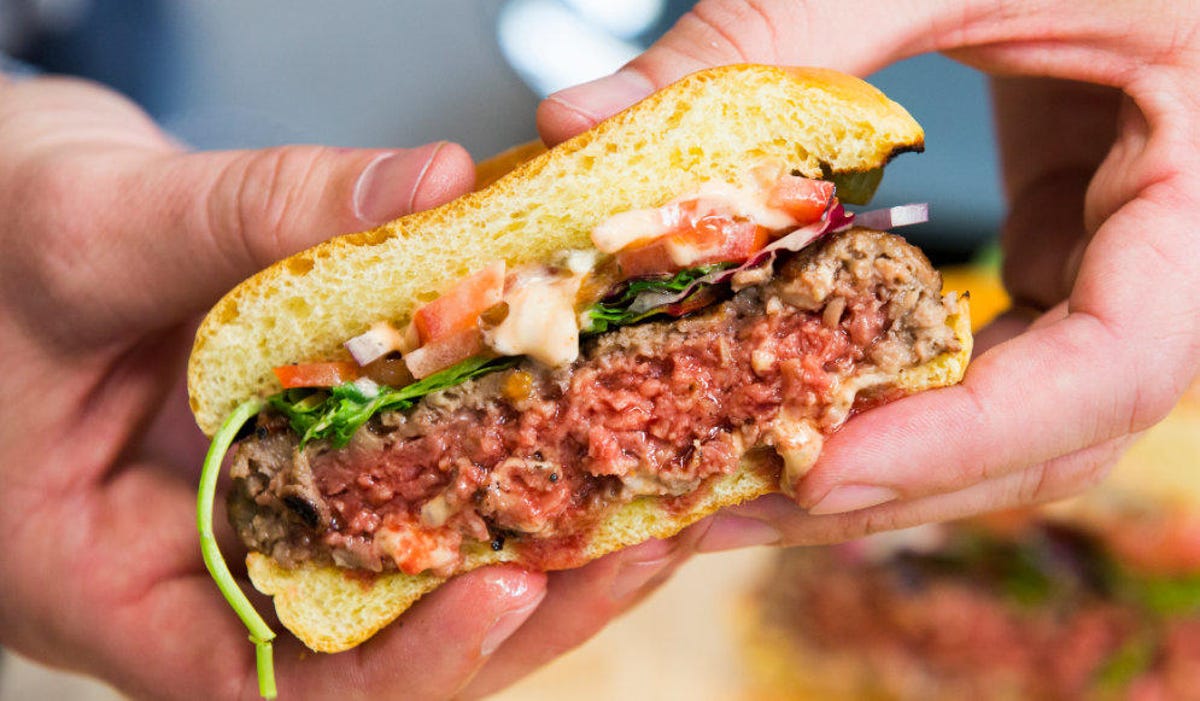Impossible Foods and beyond: Burgers, bacon, fish born from plants and labs
From Beyond Burgers to fish grown from cells, we're already tasting the future.

Impossible Burger
As more diners turn to chicken, beef, pork and seafood alternatives because of environmental concerns or as a way to enhance a vegetarian or vegan diet, innovative cultured-meat growers and makers of plant-based food are rushing to meet the demand.
Impossible Foods is one of the highest-profile purveyors of plant-based meat alternatives. The Impossible Burger got an upgrade in 2019 with a new formulation. It not only looks like a real hamburger, but many diners also report that it's almost indistinguishable from the real thing.
Impossible Whopper
Fast food may never be the same. Impossible Foods teamed with fast-food franchise Burger King in 2019 to introduce the Impossible Whopper, a nonbeef version of the famous sandwich. According to the taste buds of CNET testers, the Impossible Whopper could pass for a beef Whopper.
Impossible Pork
Not content to just mimic beef, Impossible Foods debuted Impossible Pork at CES 2020 in Las Vegas in January. The plant-based substitute steps in for ground pig meat. Impossible Foods also has plans to create a fake bacon.
Vegan fried chicken
Atlas Monroe's vegan fried chicken has the look down pat. The faux meat is based on wheat protein, but the company keeps the exact ingredient list under wraps. CNET's team tasted the extra-crispy sandwich at CES 2020. The tasters said it had a spot-on appearance, seasoning and moisture content.
Wild.Skinny.Clean shrimp
These coconut shrimp might look like they came from the deep, but they're a plant-based alternative from Wild.Skinny.Clean. A team of CNET tasters tried the shrimp at CES 2020 and said the taste and texture was on point.
A Wild.Skinny.Clean representative said the main ingredient is konjac root, a starchy tuber. The company also makes a crabless cake.
Faking bacon
Bacon is one of the holy grails of plant-based foods. It's a tough dish to imitate, though many have tried. Wild.Skinny.Clean previewed an upcoming bacon product at CES 2020 that will wrap around its plant-based shrimp. CNET's taste-testing team enjoyed the hickory flavor, sweetness and crispiness of the fake bacon.
No-duck à l'orange.
"Clean meat" innovator Memphis Meats showed off some very gourmet-looking creations in 2017. This duck à l'orange is made with duck meat grown from poultry cells.
The cells are harvested from livestock (which live through the process). The cells are fed nutrients, allowed to grow, and then harvested for eating.
'Clean meat' chicken
This Southern fried cultured chicken is another dish from Memphis Meats, which grows meat from cells in a lab. "It's real meat, and life-long meat eaters immediately recognize it and enjoy it," the company said.
Memphis Meats says its process uses less land, water and energy than regular livestock operations.
Beyond Meat burger
Impossible Foods has some competition from Beyond Meat, another purveyor of plant-based meats. Beyond offers burgers, ground "beef," sausages and crumbles, all made from plant protein. The Beyond Burger remains pink on the inside when cooked to the recommended temperature.
Cell-based yellowtail
San Diego startup BlueNalu grows whole-muscle, cell-based yellowtail fish. This dish, part of a December 2019 demonstration, features the fish in medallion form, atop a roasted butternut squash bisque. The company calls its niche "cellular aquaculture."
Lab-grown fish taco meat
Here's a closer look at BlueNalu's yellowtail. The lab-grown, cell-based fish was beer-battered and deep-fried for a culinary demonstration in late 2019. Just add tortilla and condiments.
Wild Type salmon
If yellowtail isn't your favorite fish, perhaps you'll be tempted by Wild Type's sustainable cultivated salmon. The startup has big plans to be able to create lab-grown versions of any meat.
Wild Type tested and tasted an early version of its salmon in June 2019. The company created more than a pound of the product for the occasion. "We were proud to introduce our guests to the world's first sushi created with cellular agriculture technology," the company said.
KFC looks Beyond chicken
Beyond Meat partnered with chicken chain KFC for a 2019 test run of Beyond Fried Chicken. The plant-based chicken appeared with the modified motto "it's still finger lickin' good."
Though the product itself is plant-based, it was cooked in fryers that also cook regular chicken, so some vegetarians might still want to give it a pass. KFC hasn't said if it will make the chicken alternative more widely available.
Aleph Farms lab-grown meat
This prototype meat strip came from Israeli company Aleph Farms in late 2018. The startup refers to its products as "slaughter-free meat."
Aleph Farms partnered with Russian laboratory 3D Bioprinting Solutions and two US companies for an International Space Station experiment in 2019 that used a 3D bioprinter to assemble cow cells into muscle tissue in space.
The proof-of-concept experiment is a glimpse at a possible future when astronauts could print meat in space, especially as humans look ahead to longer missions to the moon and Mars.
No-chicken nugget
It might not be the most glorious visual presentation, but what's on display here may represent the future of lab-grown meat. This chicken nugget came from San Franciso-based Just, which grew it in a lab using cells from a living chicken.
"The crunch from the breading and the smell from the fry was exactly what I expected from a good chicken nugget," a CNET taste-tester reported in 2019.
Stem-cell hamburger
This meat strip may be the least-appetizing looking item in this gallery, but it's an important part of lab-grown meat history. Dutch tissue engineer Mark Post grew cultured meat in a lab for a hamburger eaten in 2013. It took an estimated $325,000 in research and development to create the burger.

